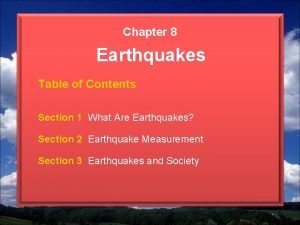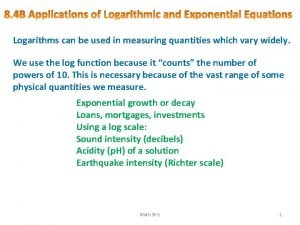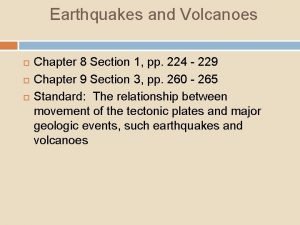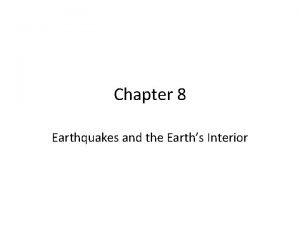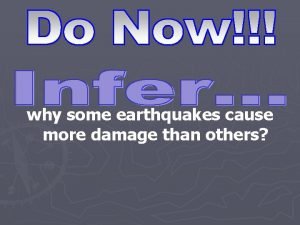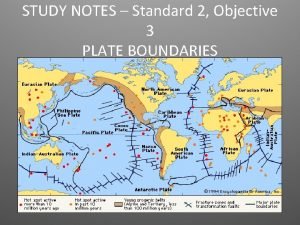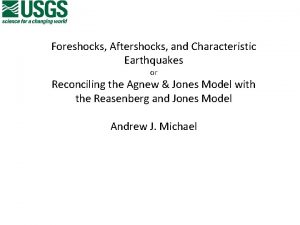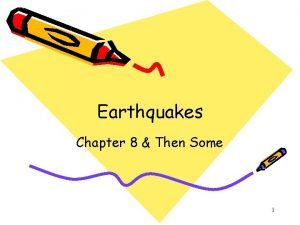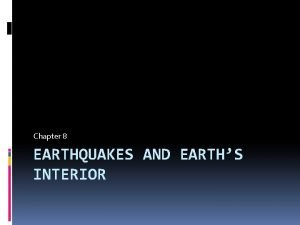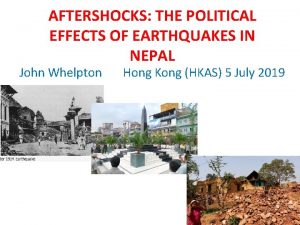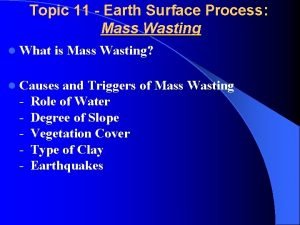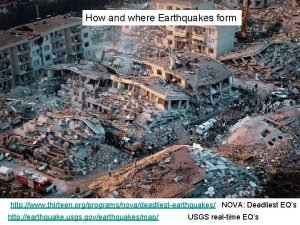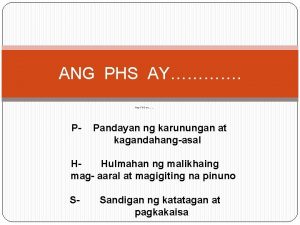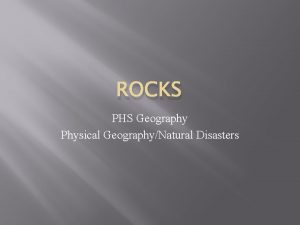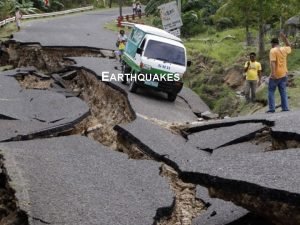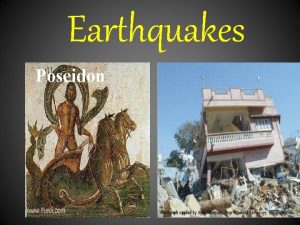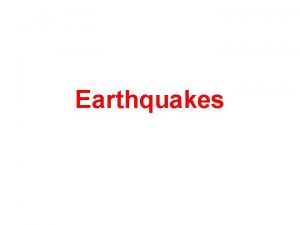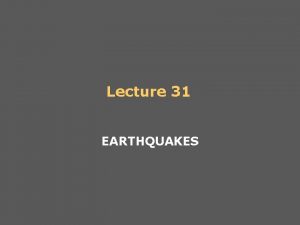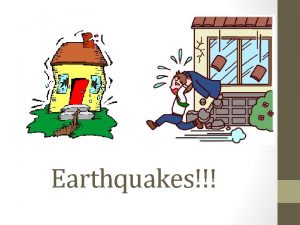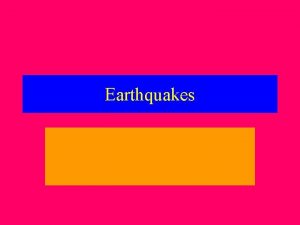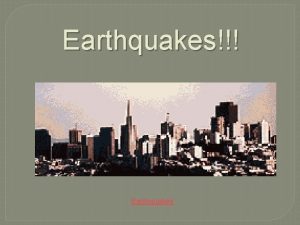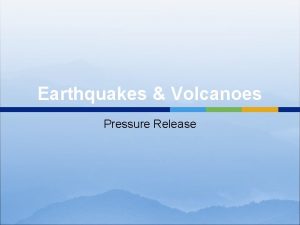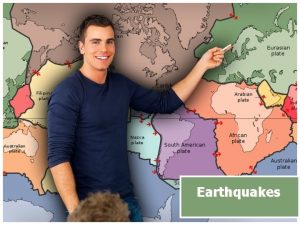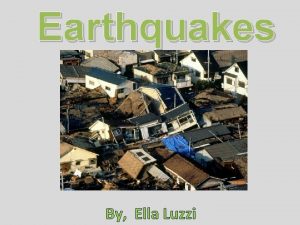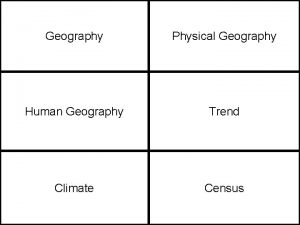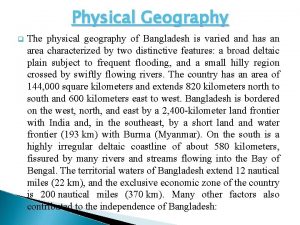Earthquakes What are Earthquakes PHS Geography Department Physical

























- Slides: 25

Earthquakes What are Earthquakes PHS Geography Department Physical Geography/Natural Disasters

Earthquakes are… The shaking or trembling caused by the sudden release of energy Usually associated with faulting or breaking of rocks Continuing adjustment of position results in aftershocks

What is the Elastic Rebound Theory? Explains how energy is stored in rocks Rocks bend until the strength of the rock is exceeded Rupture occurs and the rocks quickly rebound to an undeformed shape Energy is released in waves that radiate outward from the fault

The Focus and Epicenter of an Earthquake • • The point within Earth where faulting begins is the focus, or hypocenter The point directly above the focus on the surface is the epicenter

Seismographs record earthquake events At convergent boundaries, focal depth increases along a dipping seismic zone called a Benioff zone

Where Do Earthquakes Occur and How Often? ~80% of all earthquakes occur in the circum-Pacific belt most of these result from convergent margin activity ~15% occur in the Mediterranean-Asiatic belt remaining 5% occur in the interiors of plates and on spreading ridge centers more than 150, 000 quakes strong enough to be felt are recorded each year

Economics and Societal Impacts of EQs • • Building collapse Fire Tsunami Ground failure Damage in Oakland, CA, 1989

What are Seismic Waves? Response of material to the arrival of energy fronts released by rupture Two types: Body waves P and S Surface waves R and L

Body Waves: P and S waves Body waves P or primary waves fastest waves travel through solids, liquids, or gases compressional wave, material movement is in the same direction as wave movement S or secondary waves slower than P waves travel through solids only shear waves - move material perpendicular to wave movement

Surface Waves: R and L waves Surface Waves Travel just below or along the ground’s surface Slower than body waves; rolling and side-to-side movement Especially damaging to buildings

How is an Earthquake’s Epicenter Located? Seismic wave behavior P waves arrive first, then S waves, then L and R Average speeds for all these waves is known After an earthquake, the difference in arrival times at a seismograph station can be used to calculate the distance from the seismograph to the epicenter.

How is an Earthquake’s Epicenter Located? Time-distance graph showing the average travel times for P- and Swaves. The farther away a seismograph is from the focus of an earthquake, the longer the interval between the arrivals of the P- and S- waves

How is an Earthquake’s Epicenter Located? Three seismograph stations are needed to locate the epicenter of an earthquake A circle where the radius equals the distance to the epicenter is drawn The intersection of the circles locates the epicenter

How are the Size and Strength of an Earthquake Measured? Mercalli Scale Richter Scale From I to XII From 1 to 10 (Roman numerals) Measures the damage as a result of the quake Can change from location to location Subjective Measures the amount of energy released Quantifiable

RICHTER SCALE Measures the amount of energy released by the earthquake Each level of magnitude goes up by a factor of 10! It is logarithmic.


How are the Size and Strength of an Earthquake Measured? Intensity subjective measure of the kind of damage done and people’s reactions to it isoseismal lines identify areas of equal intensity • Modified Mercalli Intensity Map – 1994 Northridge, CA earthquake, magnitude 6. 7



How are the Size and Strength of an Earthquake Measured? Magnitude Richter scale measures total amount of energy released by an earthquake; independent of intensity Amplitude of the largest wave produced by an event is corrected for distance and assigned a value on an open-ended logarithmic scale

What are the Destructive Effects of Earthquakes? Ground Shaking amplitude, duration, and damage increases in poorly consolidated rocks

LIQUEFACTION when a solid (sand soil) becomes saturated with water and acts like a heavy liquid Results in a loss of soil strength & the ability of the soil to support weight

Can Earthquakes be Predicted? Earthquake Precursors changes in elevation or tilting of land surface, fluctuations in groundwater levels, magnetic field, electrical resistance of the ground seismic dilatancy model seismic gaps

Can Earthquakes be Predicted? Earthquake Prediction Programs include laboratory and field studies of rocks before, during, and after earthquakes monitor activity along major faults produce risk assessments

Can Earthquakes be Controlled? Graph showing the relationship between the amount of waste injected into wells per month and the average number of Denver earthquakes per month Some have suggested that pumping fluids into seismic gaps will cause small earthquakes while preventing large ones
 Mikael ferm
Mikael ferm Phs wrdsb
Phs wrdsb Ongruent
Ongruent Phs calcarea
Phs calcarea Wdfw phs
Wdfw phs Phs human subjects and clinical trials information
Phs human subjects and clinical trials information Phs group wiki
Phs group wiki In what section of earth do earthquakes happen?
In what section of earth do earthquakes happen? Btn earthquakes
Btn earthquakes Chapter 8 section 2 earthquake measurement answer key
Chapter 8 section 2 earthquake measurement answer key Define natural disaster
Define natural disaster Http://earthquake.usgs.gov/earthquakes/map/
Http://earthquake.usgs.gov/earthquakes/map/ Chapter 8 earthquakes and volcanoes
Chapter 8 earthquakes and volcanoes A large crack in the earth formed by a river or earthquakes
A large crack in the earth formed by a river or earthquakes Chapter 8 earthquakes and earth's interior
Chapter 8 earthquakes and earth's interior Chapter 19 earthquakes
Chapter 19 earthquakes Why some earthquakes cause more damage than others
Why some earthquakes cause more damage than others Frequent earthquakes in an area may indicate
Frequent earthquakes in an area may indicate Earthquakes
Earthquakes Quiz 1: earthquakes
Quiz 1: earthquakes Chapter 8 earthquakes and earth's interior answer key
Chapter 8 earthquakes and earth's interior answer key Earthquakes
Earthquakes Mass wasting
Mass wasting Elastic rebound
Elastic rebound Why do earthquakes occur
Why do earthquakes occur Do earthquakes happen
Do earthquakes happen









